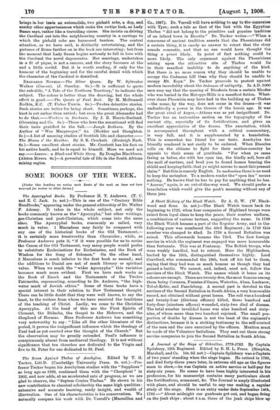The Seven Against Thebes of Aeschylus. Edited by T. G.
Tucker, Litt.D. (Cambridge University Press. 9s. net.)—Pro- fessor Tucker began his Aeschylean studies with the " Supplices " as long ago as 1889, continued them with the " Choephori " in 1902, and now adds, at an accelerated rate of progress, as we are glad to observe, the " Septem Contra Thebes." He shows in his new contribution to classical scholarship the same high qualities : extensive and accurate learning, ready insight, and wealth of illustration. One of his characteristics is his conservatism. We naturally compare his work with Dr. Verrall's (Macmillan and
Co., 1887), Dr. Verrall will have nothing to say to the connexion with Tyre; such a tale as that of the link with the Egyptian Thebes " did not belong to the primitive and genuine tradition of au inland town in Boeotia." Dr. Tucker writes :—" When a consensus of ancient tradition asserts that the Phoenicians did a certain thing, it is surely no answer to retort that the story sounds romantic, and that no one would have thought the thing a priori likely. In point of fact nothing could be more likely. The only argument against the Phoenicians seizing upon the attractive site of Thebes would lie in their manifest inability to do anything of the kind. But there is no more reason why they should be unable to occupy the Cadmean hill than why they should be unable to occupy Mt. Eryx." Dr. Tucker proceeds to protest against modern incredulity about the SsZyissos of antiquity. In A.D. 6000 men may say that the naming of Rhodesia from a certain Rhodes who was buried in the Matoppo Hills is a manifest fiction. What- ever share Phoenicia may have had in the building up of Thebes —the name, by the way, does not occur in the drama—it was undoubtedly a power in the Greece of the heroic) age. It was the great rival of Argos,—Athens was as yet insignificant. Dr. Tucker has an instructive section on the topography of the ancient city, especially of its fortifications, and gives an excellent appreciation of the drama. The annotation, which is accompanied throughout with a critical commentary, is very full, and it is supplemented by a translation. This is somewhat too literal for our taste. Aeschylus too literally rendered is not easily to be endured. When Eteocles calls on the citizens to fight for their mother-country he appeals to their sense of gratitude. "For when ye came faring as babes, she with her open inn, the kindly soil, bore all the moil of nurture, and bred you to found homes bearing the shield and keeping faith, that ye might accrue to meet this present claim." But this is scarcely English. In oravSmeogaa there is no need to keep the metaphor. To a modern reader the " open inn" means nothing. He knows that he has to pay for anything that he has. " Accrue," again, is an out-of-the-way word. We should prefer a translation which would give the poet's meaning without any of these jars.


































 Previous page
Previous page